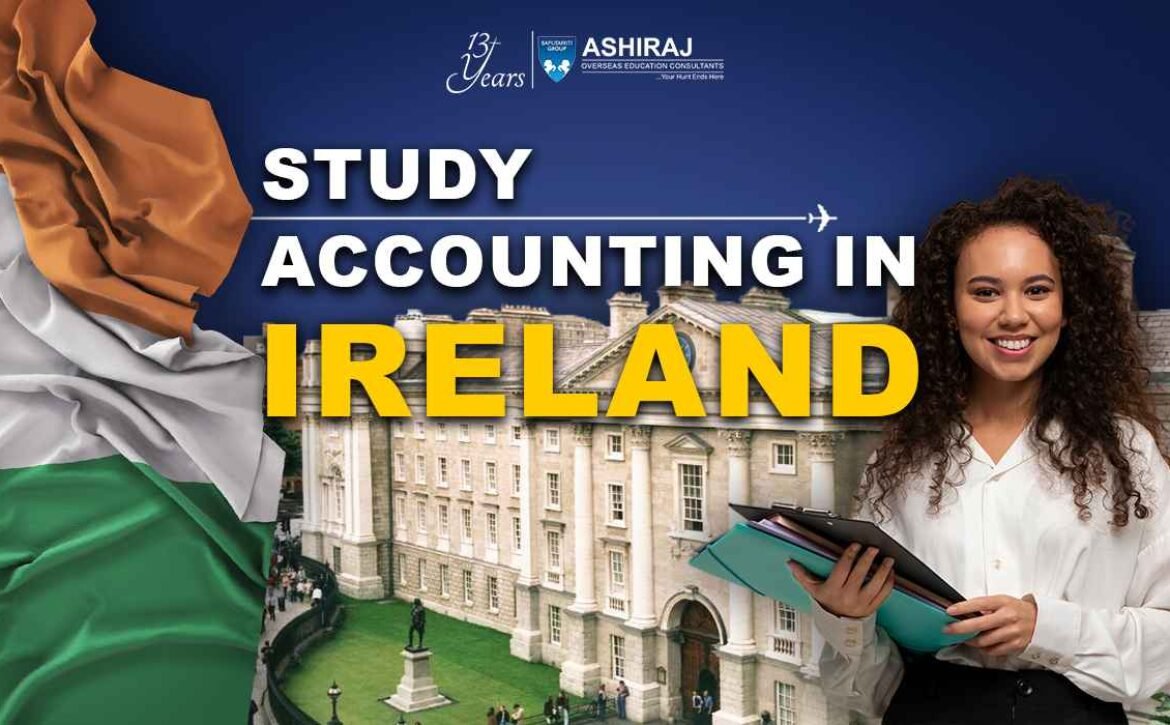
Accounting in Ireland
Accounting in Ireland holds a pivotal role in the country’s economic landscape, serving as a cornerstone for business operations, financial transparency, and regulatory compliance. With a robust framework governed by stringent standards and regulations, Ireland’s accounting practices adhere to both international norms and domestic requirements. This ensures the integrity and reliability of financial reporting, fostering trust among stakeholders and investors alike.
In Ireland, accounting encompasses a diverse array of sectors, including multinational corporations, SMEs, and the public sector, each operating within a dynamic and competitive environment. From auditing and taxation to financial advisory services, accounting professionals play a vital role in supporting organizational decision-making and driving sustainable growth. Amidst the ever-evolving global economy, Ireland’s accounting sector remains adaptive and resilient, contributing significantly to the country’s reputation as a hub for innovation and investment.
Why to Study Accounting in Ireland?
- International Recognition: Ireland’s accounting qualifications are internationally recognized, providing opportunities for global career advancement.
- Thriving Economy: Ireland boasts a dynamic economy with a strong focus on industries like technology, finance, and pharmaceuticals, offering ample prospects for accounting professionals.
- Educational Excellence: Irish universities and colleges offer high-quality accounting programs, blending theoretical knowledge with practical skills essential for professional success.
- Multinational Presence: Many multinational corporations have European headquarters in Ireland, providing students with exposure to diverse accounting practices and opportunities for internships and employment.
- Networking Opportunities: Ireland’s vibrant business community fosters networking opportunities, allowing students to connect with industry professionals and potential employers.
- Cultural Experience: Studying in Ireland offers a rich cultural experience, with its welcoming atmosphere, vibrant cities, and stunning landscapes.
- Innovation Hub: Ireland is known as a global innovation hub, offering a conducive environment for accounting students to engage with cutting-edge practices and technologies.
- Pathway to Citizenship: For international students, studying accounting in Ireland can be a pathway to residency and citizenship, given the country’s favorable immigration policies.
In conclusion, studying accounting in Ireland offers a unique blend of academic excellence, professional opportunities, and cultural enrichment, making it an attractive destination for aspiring accountants worldwide.
Top Universities to Study Accounting in Ireland
University | QS World University Rankings 2023 | Type of University | Average Annual Fees (EUR) | Programs Offered |
Trinity College Dublin | 75 | Public | 15,000 – 20,000 | Bachelor’s, Master’s, PhD in Accounting |
University College Dublin | 99 | Public | 13,000 – 18,000 | Bachelor’s, Master’s, PhD in Accounting |
National University of Ireland, Galway | 231 | Public | 12,000 – 16,000 | Bachelor’s, Master’s in Accounting |
University College Cork | 251-300 | Public | 11,000 – 15,000 | Bachelor’s, Master’s in Accounting |
Dublin City University | 301-350 | Public | 10,000 – 14,000 | Bachelor’s, Master’s in Accounting |
Studying accounting in Ireland offers a plethora of opportunities for aspiring professionals. The country’s top universities, including Trinity College Dublin and University College Dublin, consistently rank among the best globally. These institutions provide comprehensive programs ranging from bachelor’s to doctoral degrees in accounting. With average annual fees ranging from 10,000 to 20,000 EUR, studying in Ireland remains affordable compared to other Western European countries. Additionally, universities like the National University of Ireland, Galway, University College Cork, and Dublin City University offer diverse programs tailored to meet the needs of students pursuing careers in accounting. Overall, Ireland’s esteemed universities and their accounting programs prepare graduates for successful careers in this dynamic field, both domestically and internationally.
Course Curriculum for Accounting in Ireland
- Foundational Principles: The curriculum begins with an emphasis on foundational principles, covering topics such as financial accounting, management accounting, and business law, providing students with a solid understanding of the fundamental concepts.
- Advanced Accounting Practices: As students progress, they delve into more advanced accounting practices, including auditing, taxation, and financial reporting, honing their analytical skills and critical thinking abilities.
- Technology Integration: The integration of technology is a prominent feature of accounting education in Ireland, with courses focusing on software applications, data analytics, and information systems, preparing students for the digital transformation of the accounting profession.
- Professional Ethics: Ethics and professionalism are integral components of the curriculum, ensuring that students develop a strong ethical framework and understand their responsibilities as accounting professionals.
- Industry-Relevant Projects: Many programs incorporate industry-relevant projects and internships, allowing students to apply theoretical knowledge in real-world settings and gain practical experience.
- International Perspectives: Given Ireland’s status as a global business hub, courses often incorporate international perspectives, exposing students to global accounting standards and practices, preparing them for careers in multinational corporations or international firms.
- Continuing Education Opportunities: The curriculum also emphasizes the importance of lifelong learning, providing students with opportunities for continuing education and professional development to stay abreast of evolving accounting standards and regulations.
In summary, the course curriculum of accounting in Ireland is comprehensive, integrating theoretical knowledge with practical skills, ethics, technology, and international perspectives, to prepare students for successful careers in the dynamic field of accounting.
Eligibility Criteria & Admission Requirements for MS in Accounting in Ireland
- Language Proficiency: Applicants must demonstrate proficiency in English through standardized tests such as IELTS or TOEFL. Minimum scores typically range from 6.5 to 7.0 for IELTS and 90 to 100 for TOEFL.
- Standardized Tests: Depending on the program, candidates may be required to submit scores for either GRE or GMAT. GRE scores should ideally be around 310-320, while GMAT scores should be in the range of 600-700.
- Educational Qualifications: Applicants should hold a relevant bachelor’s degree in accounting or a related field from a recognized institution. Academic transcripts and certificates are required for verification.
- Work Experience: While not always mandatory, some programs may prefer applicants with relevant work experience in accounting or finance. This could enhance the candidate’s profile during the selection process.
Table: Standardized Test Scores
Test | Minimum Score |
IELTS | 6.5 – 7.0 |
TOEFL | 90 – 100 |
GRE | 310 – 320 |
GMAT | 600 – 700 |
- Passport & Student Visa: International students must possess a valid passport and obtain a student visa to study in Ireland. The visa application process typically requires proof of acceptance from a recognized educational institution, financial stability, and health insurance coverage.
- Academic Certificates: Applicants must provide certified copies of academic certificates, including transcripts and diplomas, to demonstrate their educational background and qualifications.
In conclusion, meeting the eligibility criteria for studying accounting in Ireland involves demonstrating proficiency in English, achieving satisfactory standardized test scores, possessing relevant educational qualifications, and fulfilling visa requirements.
Documents Required for Studying Accounting in Ireland
- Passport: A valid passport is essential for international students applying to study accounting in Ireland. Ensure that it remains valid throughout your stay.
- Letters of Recommendation (LOR): Typically, two letters of recommendation from academic or professional referees are required to assess your suitability for the program.
- Statement of Purpose (SOP): The SOP provides insight into your academic and career goals, explaining why you wish to pursue accounting in Ireland and how it aligns with your aspirations.
- Curriculum Vitae (CV): Your CV should highlight your educational background, work experience, skills, and achievements relevant to accounting.
- Official High School Transcripts: Transcripts from your high school or secondary education institution are necessary to evaluate your academic performance.
- Educational Certificates: Certified copies of educational certificates, including diplomas and degrees, validate your academic qualifications.
- Work Experience Certificate: If applicable, provide a work experience certificate to showcase any relevant professional experience in the field of accounting.
- Proof of Financial Resources: Demonstrating sufficient financial resources is crucial for visa purposes. This includes bank statements or sponsorship letters confirming your ability to cover tuition fees and living expenses.
Ensuring that you have all the necessary documents ready and organized will streamline the application process for studying accounting in Ireland.
Admission Process for Accounting in Ireland
- Research Programs: Begin by researching accounting programs offered by universities in Ireland, considering factors such as curriculum, faculty expertise, and reputation.
- Check Eligibility Criteria: Review the eligibility criteria for each program, ensuring that you meet requirements related to academic qualifications, standardized test scores, and language proficiency (IELTS or TOEFL).
- Prepare Required Documents: Gather all necessary documents, including transcripts, certificates, letters of recommendation (LOR), statement of purpose (SOP), curriculum vitae (CV), and proof of financial resources.
- Submit Application: Complete the online application form for your chosen program, providing accurate information and attaching all required documents as per the university’s instructions.
- Pay Application Fee: Pay the application fee, if applicable, as per the university’s guidelines. Keep proof of payment for your records.
- Wait for Response: After submitting your application, wait for the university’s response. This may take several weeks, so be patient.
- Interview (if required): Some programs may require an interview as part of the admission process. Prepare thoroughly and demonstrate your enthusiasm and suitability for the program.
- Receive Admission Offer: Upon acceptance, you will receive an official admission offer from the university. Review the offer carefully and follow the instructions provided.
- Accept Offer and Pay Deposit: If you decide to accept the offer, follow the university’s instructions to confirm your acceptance and pay any required deposit to secure your place.
- Apply for Student Visa: Once you have secured admission, apply for a student visa to study accounting in Ireland. Follow the visa application process and ensure compliance with all requirements.
By following these steps diligently, you can navigate the admission process for studying accounting in Ireland smoothly and efficiently.
“Education is the most powerful weapon which you can use to change the world.”
Nelson Mandela
Cost of Accounting Course in Ireland
- Tuition Fees: The cost of tuition for accounting programs in Ireland varies depending on the university and the level of study. On average, annual tuition fees for international students range from €10,000 to €20,000.
- Accommodation: Accommodation costs also vary based on factors such as location and type of accommodation. Options include university dormitories, private rentals, and homestays. Expect to budget between €400 to €1,000 per month for accommodation.
- Living Expenses: Other living expenses, including food, transportation, utilities, and leisure activities, should also be factored into your budget. A monthly budget of approximately €700 to €1,000 is reasonable for living expenses in Ireland.
- Health Insurance: International students are required to have health insurance coverage while studying in Ireland. The cost of health insurance varies depending on the provider and level of coverage but typically ranges from €500 to €1,000 per year.
- Additional Costs: Additional expenses may include visa fees, textbooks, academic supplies, and extracurricular activities. It’s important to budget for these costs to ensure a comfortable and enjoyable experience while studying accounting in Ireland.
Understanding the cost of studying accounting in Ireland is essential for effective financial planning and ensuring a smooth transition to student life in the country.
Scholarships for Accounting Courses in Ireland
Scholarship Name | Amount | Application Deadline |
Government of Ireland Scholarship | Full tuition fees, €10,000 stipend for living expenses | Varies (typically February to April) |
Trinity College Dublin Scholarships | Partial tuition fee waivers | Varies (usually April) |
University College Dublin Scholarships | €3,000 to €5,000 tuition fee reduction | Varies (typically May to June) |
National University of Ireland, Galway Scholarships | Up to €4,000 tuition fee reduction | Varies (usually June) |
University College Cork Scholarships | Partial tuition fee waivers | Varies (typically March to May) |
Scholarships provide valuable financial support for international students pursuing accounting studies in Ireland. The Government of Ireland Scholarship offers full tuition coverage and a stipend for living expenses, while other universities like Trinity College Dublin and University College Dublin offer partial tuition fee waivers. Application deadlines vary but generally fall between February and June. Applying for scholarships early and meeting all requirements increases the chances of securing financial assistance for your accounting education in Ireland.
Career Opportunities After Accounting in Ireland
Job Profile | Average Salary (EUR) |
Financial Accountant | €40,000 – €60,000 |
Management Accountant | €45,000 – €70,000 |
Auditor | €40,000 – €65,000 |
Tax Consultant | €45,000 – €70,000 |
Financial Analyst | €45,000 – €75,000 |
Accounting graduates in Ireland enjoy a plethora of career opportunities across various sectors. Financial accountants are responsible for preparing financial statements and reports, with an average salary ranging from €40,000 to €60,000. Management accountants focus on budgeting, cost analysis, and financial planning, earning between €45,000 to €70,000 annually. Auditors ensure compliance with financial regulations and internal policies, with salaries averaging between €40,000 to €65,000. Tax consultants provide advice on tax matters, with earning potentials ranging from €45,000 to €70,000. Financial analysts analyze financial data to provide insights for decision-making, earning between €45,000 to €75,000. Pursuing a career in accounting in Ireland offers lucrative opportunities for professional growth and financial stability, making it an attractive choice for aspiring accountants.
Frequently Asked Questions About Accounting in Ireland
Entry requirements typically include a relevant bachelor’s degree, English language proficiency (IELTS or TOEFL), and standardized test scores (GRE or GMAT).
Yes, various scholarships are available, including government-funded scholarships and university-specific awards. Deadlines and eligibility criteria vary.
The average annual tuition fees range from €10,000 to €20,000, with additional expenses for accommodation, living expenses, and health insurance.
Career options include roles such as financial accountant, management accountant, auditor, tax consultant, and financial analyst, with salaries ranging from €40,000 to €75,000.
While not always mandatory, some programs may prefer applicants with relevant work experience in accounting or finance.
The duration varies depending on the level of study. A bachelor’s degree typically takes three to four years, while master’s programs may range from one to two years.
Required documents include academic transcripts, certificates, letters of recommendation, statement of purpose, curriculum vitae, proof of financial resources, passport, and student visa.
Yes, international students are permitted to work part-time (up to 20 hours per week) during term time and full-time during holidays.
Yes, many accounting programs in Ireland offer opportunities for internships, providing valuable practical experience and networking opportunities.
To apply for a student visa, you need to secure admission to a recognized educational institution, demonstrate financial stability, and fulfill health insurance requirements, among other criteria.




